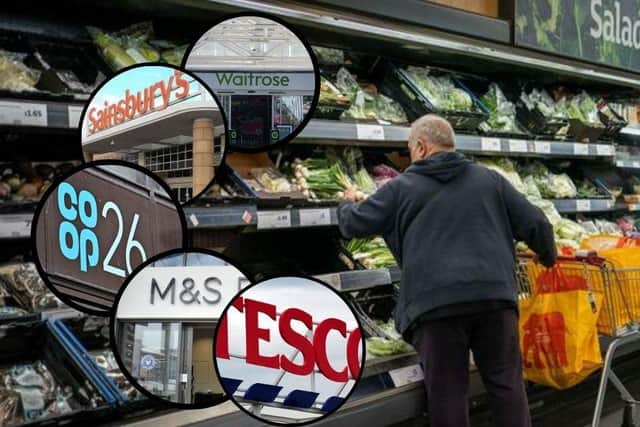COP26: Five UK supermarket bosses commit to halve environmental impact by 2030
Chief executives from Tesco, Sainsbury’s, Waitrose, Co-op and M&S said they would work with the World Wide Fund for Nature (WWF) to reduce natural destruction.
Under a pledge they will halve the amount of global warming that shopping baskets cause, the forests that are cut down to fill the baskets, the impact of the agriculture and seafood in baskets, and the food waste and packaging they produce.
Advertisement
Hide AdAdvertisement
Hide AdEvery year, the supermarkets – who together reach more than half of UK food shoppers – will submit data to WWF on each of these areas and publish their actions.
The shops also promised that before the end of next year they would set science-based targets to help keep global warming below 1.5C above pre-industrial temperatures.
The targets will cover all categories of emissions – known as scopes.
“As CEOs of leading UK food retailers, we recognise that a future without nature is a future without food. By 2030 we need to halt the loss of nature,” the supermarkets agreed in a joint statement.
WWF chief executive Tanya Steele said that it will not be possible to tackle climate change and keep global warming to below 1.5C without dealing with global food supplies.


“Food production is one of the biggest threats to our planet and we will only tackle the climate and nature emergency if food retailers play their part,” she added.
“The promises these CEOs have made are game changing and we hope other food retailers will follow in their footsteps so that every shopper can be confident that the products they buy aren’t fuelling the climate crisis and pushing precious wildlife closer to the brink.”
The food sector is responsible for more than 30 per cent of total climate emissions, and 60 per cent of the lost nature around the world, so reducing its impact will be a major step.
Advertisement
Hide AdAdvertisement
Hide AdEvery year it emits 17.3 billion metric tonnes of carbon dioxide, about 19 times more than commercial planes.
Separately, 20 new governments have signed up to the Forest, Agriculture and Commodity Trade (FACT) dialogue forum which commits them to opening talks.
The members of FACT will discuss trade and market development, research and how to improve agriculture, as well as support for small farmers.
The membership includes Indonesia and Brazil, who have some of the world’s biggest forests.
It also includes major consuming countries, such as the UK, whose demand often causes the deforestation elsewhere.
Together the group represents 75 per cent of global trade in key commodities that threaten forests, such as palm oil, cocoa and soya.
But signing up just commits them to a “desire to open dialogue” and actions are “non-exhaustive, non-binding and do not apply in all circumstances to all countries.”
Tropical Forest Alliance executive director Justin Adams said that the dialogue group “has created new momentum”.
Advertisement
Hide AdAdvertisement
Hide Ad“Bringing these governments together – from the global south and north – to tackle the issue of commodity production and deforestation head on is a very significant development,” he said.
“Continued dialogue after COP26 will be critical to progress.”
A message from the Editor:Thank you for reading this article. We're more reliant on your support than ever as the shift in consumer habits brought about by coronavirus impacts our advertisers.
If you haven't already, please consider supporting our trusted, fact-checked journalism by taking out a digital subscription.
Comments
Want to join the conversation? Please or to comment on this article.